Apr. 2017 Events – Online & BC-wide
Bookmark this post! It will be updated as more events are announced. You can also get frequent updates via our Twitter. Have a suggestion? Email us.
- Saturday, April 1 (2:00-5:00pm): West Coast LEAF presents Why Your Vote Counts: Women’s Equality and the BC Provincial Election
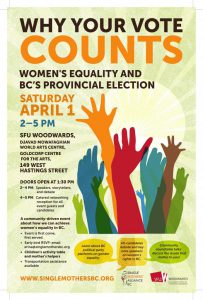 at SFU Woodwards, David Mowafaghian World Arts Centre at 149 West Hastings St, Vancouver
at SFU Woodwards, David Mowafaghian World Arts Centre at 149 West Hastings St, Vancouver
A community-driven event about how we can achieve women’s equality in BC. Join the Single Mothers’ Alliance BC for an all-candidates debate and keynote speakers on women’s rights in BC. Ahead of the May 9 provincial general election, learn about BC political party platforms on gender equality and discuss the issues that matter to you in community roundtables. The event will end with a networking reception for all attendees.
- April 2-10 (Various Dates): Pacific Legal Education Outreach Society (PLEO)
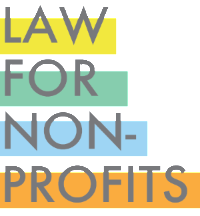 presents Societies Act Transition Workshops, in In Kaslo, Nanaimo and Revelstoke.
presents Societies Act Transition Workshops, in In Kaslo, Nanaimo and Revelstoke.
The BC Society Act, which provides the rules for governance and incorporation of non-profits, officially proclaimed important changes on November 28, 2016. There will be a two year transition period by which time all societies in BC will have to make the switch to the new Act. This workshop will provide the information on the bylaw and policy changes necessary for your organization to effectively make the transition when the new Act is proclaimed.
Tickets are $50, or free for workshops in the Kootenays (Kaslo & Revelstoke) due to the funding and support of Columbia Basin Trust.
- April 3-27 (Various Dates): People’s Law School
 presents numerous events (some in collaboration with Mediate BC) on the following topics in Burnaby, Cranbrook, Lake Cowichan, Nanaimo, North Vancouver, Port Moody, Richmond, Surrey and Vancouver:
presents numerous events (some in collaboration with Mediate BC) on the following topics in Burnaby, Cranbrook, Lake Cowichan, Nanaimo, North Vancouver, Port Moody, Richmond, Surrey and Vancouver:
Wills & Estates, MyLawBC (guided pathways), Strata Law, Restorative Justice (in collaboration with Mediate BC), Scams, Employment Law, Civil Litigation, Power of Attorney, Investment Frauds, & Effective Enquiries (in collaboration with Mediate BC)
- April 5 & 8 (Various Dates): BCCLA has a couple of events going on this month:

April 5 (7:00pm) Justice for Hassan Diab – Mr. Diab’s Canadian lawyer Don Bayne and Hasan Alam of Critical Muslim Voices speak about the 8 year nightmare of Hassan Diab. At the Vancouver Public Library, Central Branch, Combined Peter and Alma Room, 350 W. Georgia St, Vancouver, BC. RSVP required.
April 8 (2:00-4:00pm) Equal Citizenship: No More Second-Class Citizens! Join us for a discussion featuring the BC Civil Liberties Association’s Executive Director, Josh Paterson, to talk about citizenship equality and your rights as a Canadian citizen. At the Welsh Hall East, West Vancouver Memorial Library (1950 Marine Dr, West Vancouver, BC). RSVP here.
- April 5-26 (Various Dates): Nidus
 presents online webinars & an in-person presentation on Personal Planning
presents online webinars & an in-person presentation on Personal Planning
Wednesday, April 5 (11:30-12:30pm) Online Webinar: Live Demo of the Personal Planning Registry. Register Online.
Wednesday, April 12 (11:30-12:30pm) Online Webinar: Planning for Health and Personal Care. Register Online.
Wednesday, April 12 (1:00-2:30pm) In-Person Presentation: Planning for incapacity and end-of-life. No Registration required. At South Granville Seniors Centre, 1420 West 12th Avenue (between Granville & Hemlock) in Vancouver. Held in lounge on 3rd floor.
Wednesday, April 26 (11:30-12:30pm) Online Webinar: Planning for Financial and Legal Matters. Register Online.
- Thursday, April 6 (11:00am-1:00pm): The BC Provincial Court is holding its second ever Twitter Town Hall with Chief Judge Crabtree. Participate online at #AskChiefJudge.
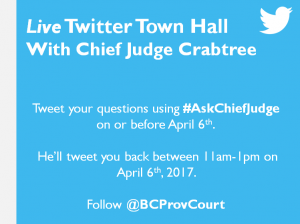
Do you have questions for the Chief Judge? About his career and experience as a Provincial Court Judge and as the Chief Judge of the Court? About his leadership and the Court’s many initiatives? About judicial appointments, judicial education, reducing delays, changes to Small Claims Court or …? Tweet your questions using #AskChiefJudge on or before April 6, 2017. “He’ll tweet you back between 11:00 am and 1:00 pm. Please note that the Chief Judge can’t discuss individual cases or political issues. Not available on April 6? Tweet questions to #AskChiefJudge any time before April 6!
- Monday, April 10 (7:00-9:00pm): Disability Alliance BC and partner organizations present Basic Income at the Roundhouse Theatre, 181 Roundhouse Mews, Vancouver.
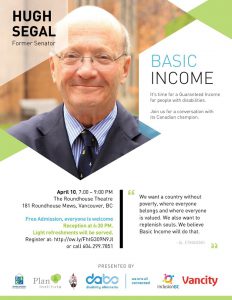
Join the conversation with Hugh Segal, Former Senator to discuss a Guaranteed Income for people with disabilities. Free Admission – everyone welcome. Reception at 6:30pm, light refreshments will be served.
Register at: http://ow.ly/FhtG309N9Jl or call 604.299.7851
- Thursday, April 13 (1:00-2:20pm): TRU Law Students present Justice League: Battle of the Apps
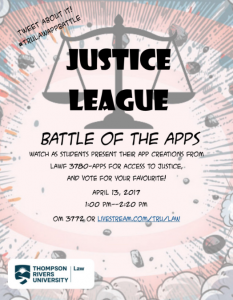
Watch as students present their App creations from LAWF 3780 – Apps for Access to Justice, and vote for your favourite! OM 3772 or http://livestream.com/tru/law
We’ll be live-streaming this event at the Vancouver Courthouse Library, 3rd floor, 800 Smithe Street, and at our Kamloops Courthouse Library, 455 Columbia Street, Room 314. Let the front desk know when you walk into the library that you’re here to watch the Battle of the Apps. If you have any questions, email training@courthouselibrary.ca.
- Thursday, April 27 (12:30pm-1:30pm):
Courthouse Libraries BC, Disability Alliance BC and PovNet present an online webinar: BC Provincial Disability Assistance Updates
A number of important changes to disability assistance benefits have been introduced in recent years 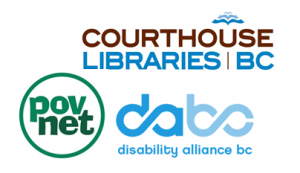 which affect persons with disabilities (PWD) applicants and recipients including the introduction of an Annualized Earnings Exemption (AEE), several new categories of income exemptions (including gifts), and a significant asset limit increase. In this one hour webinar offered jointly by POVNet, Disability
which affect persons with disabilities (PWD) applicants and recipients including the introduction of an Annualized Earnings Exemption (AEE), several new categories of income exemptions (including gifts), and a significant asset limit increase. In this one hour webinar offered jointly by POVNet, Disability
Alliance BC and Courthouse Libraries BC, Sam Turcotte & Annette Murray of Disability Alliance BC will summarize the most important recent changes and examine how they benefit people receiving or applying for PWD benefits as well as some of the challenges and misconceptions that have arisen as a result.
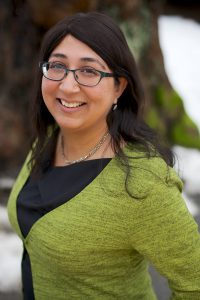 Besides being incredibly accomplished, she has a strong passion for justice — we talked about how she works towards a more equal society as part of the West Coast LEAF team:
Besides being incredibly accomplished, she has a strong passion for justice — we talked about how she works towards a more equal society as part of the West Coast LEAF team: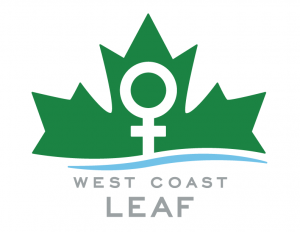 For more than 30 years, we’ve been using multiple strategies to challenge gender-based inequalities:
For more than 30 years, we’ve been using multiple strategies to challenge gender-based inequalities:
